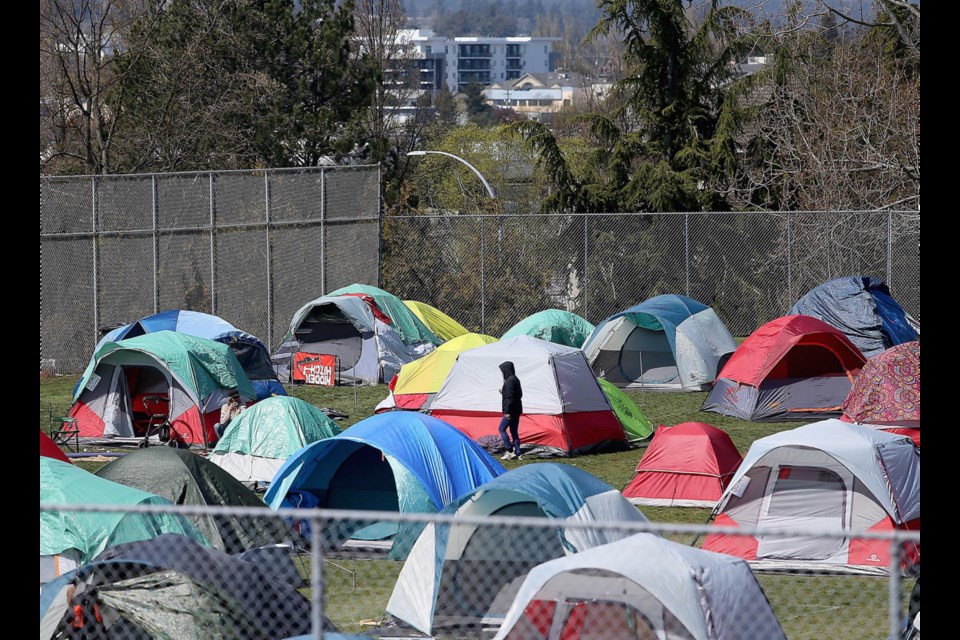On Pandora Avenue outside Our Place, dozens of tents housing the city’s most vulnerable are bumped up against each other.
Bicycles and recycling bins are strewn about. Someone is playing a recorder. Someone else is coughing.
It’s impossible for those camped out in the 900 block of Pandora Avenue to keep their distance from other campers — one of the main ways to stop the spread of COVID-19.
Across town at Topaz Park, it’s a different scene. Two hundred tents have been set up in army-camp fashion on the former soccer fields. There is a hand-washing station, showers, washrooms, security and support workers.
Campers are given three nutritious meals a day, said Kelly Roth, executive director of the Greater Victoria Coalition to End Homelessness.
At Topaz, campers can get harm-reduction and overdose-prevention services, along with help from St. John’s Ambulance. Outreach workers and street nurses are available, and if somebody has symptoms of the virus, they are referred to Island Health, Roth said.
None of the campers has tested positive for the COVID-19 virus, she said. Anyone who begins showing symptoms will be assessed by medical staff, isolated and removed from the camp immediately.
The tents have been moved into a marked grid to provide access to staff and as part of a fire-safety system, Roth said.
“And the really important thing that we’re all working to do — bylaw, fire, police and outreach workers — is building relationships so people know that everyone is one community and we all have each other’s best interests. There’s not an us and them in this space,” said Roth.
“Nobody’s been here before in a pandemic. There’s no road map. We’re trying to make sure our vulnerable population experiencing homelessness has the same opportunity to be safe as people who can stay home.”
Some residents of the Topaz Park neighbourhood no longer feel safe in their homes, however.
One resident, who wanted to remain anonymous, said he’s terrified and the situation is getting worse and worse.
“We’ve had people on our property at all times of the day. They’re stealing things out of garbage cans and if they’re getting everything that’s needed, why are they coming on to our properties?” he said. “There are drug dealers crawling all over the park. I’ve been approached twice by some guy trying to sell me fentanyl. I don’t go in the park anymore.”
The Topaz Park resident said he’s been chased out of the park twice by intoxicated men. He said lack of information is one of the biggest challenges, and many neighbours worry the problems won’t end when the outbreak is over.
“Honestly, we feel we’ll be dealing with this like every other tent city.”
Victoria Mayor Lisa Helps said B.C. Housing and Island Health are working hard to move people indoors, but face a number of obstacles, including difficulties finding staffing for indoor facilities. “They’re challenging environments to work in and … all the health workers are already working really hard.”
Initially, the agencies planned to open three temporary tenting sites, at Topaz, Beacon Hill and Royal Athletic parks. But two of the three sites were later nixed, leaving only Topaz for tenting.
B.C. Housing said last week that it had secured 160 hotel and motel rooms where people without homes can self-isolate, and had referred 115 people to those spaces.
The agency said it was in negotiations with other hotels to secure more rooms and was in the process of identifying city-owned buildings that might be suitable for temporary housing.
Meanwhile, Our Place is still serving about 1,000 meals a day and sheltering 175 people at First Metropolitan, My Place, the 919 Pandora drop-in and New Roads in View Royal.
Grant McKenzie, director of communications for Our Place, said he’s very concerned about the vulnerable street population, many members of which don’t understand the necessity to keep physically distanced and have compromised health or immune systems.
McKenzie said he has heard all sort of plans to help the people camping on Pandora Avenue, but nothing’s come through. “We’re just waiting for the other shoe to drop. And that’s not a good place to be,” he said.
On Friday, city staff, acting on council’s directions, installed a portable-shower facility on the 900 block of Pandora. A City of Victoria worker helped Our Place open its showers. The worker, dressed in a Hazmat suit, cleaned the shower after every use. That meant 100 people who hadn’t had a shower in a long time were able to get clean.
“In the middle of a pandemic, when [provincial health officer] Dr. Bonnie Henry is telling us every day to wash your hands, if you’re living outside, washing your hands is not as simple as it sounds,” said Helps.
“So city staff has been working hard on those measures and they are in place, but the real solution is to move people indoors.”



